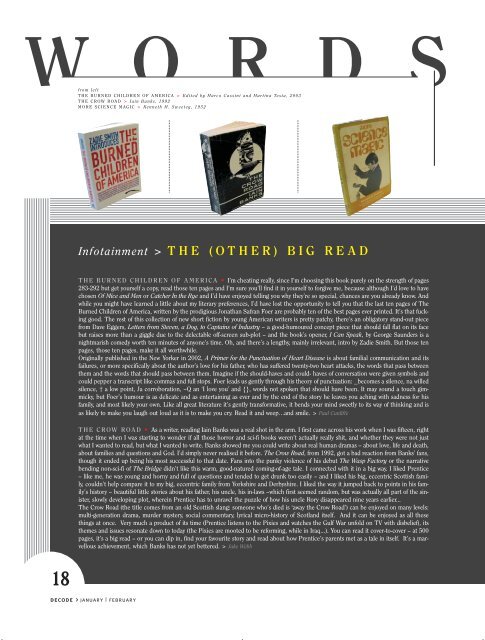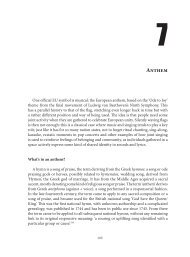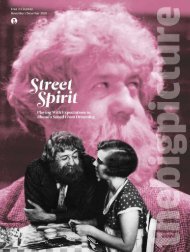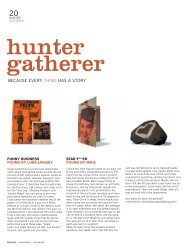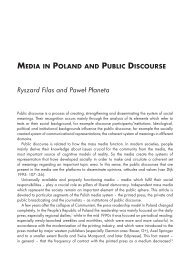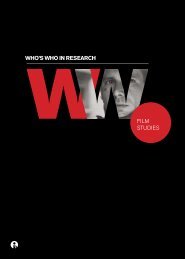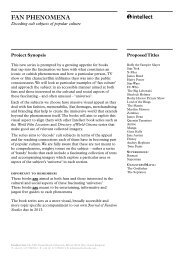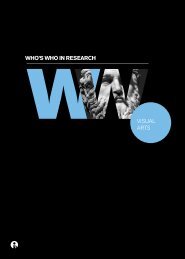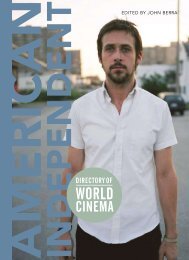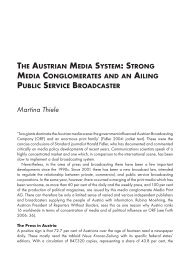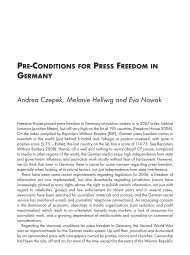Infotainment > THE (OTHER) BIG READ - Intellect
Infotainment > THE (OTHER) BIG READ - Intellect
Infotainment > THE (OTHER) BIG READ - Intellect
You also want an ePaper? Increase the reach of your titles
YUMPU automatically turns print PDFs into web optimized ePapers that Google loves.
W O R D S<br />
from left<br />
<strong>THE</strong> BURNED CHILDREN OF AMERICA > Edited by Marco Cassini and Martina Testa, 2003<br />
<strong>THE</strong> CROW ROAD > Iain Banks, 1992<br />
MORE SCIENCE MAGIC > Kenneth M. Sweetey, 1952<br />
18<br />
<strong>Infotainment</strong> > <strong>THE</strong> (O<strong>THE</strong>R) <strong>BIG</strong> <strong>READ</strong><br />
<strong>THE</strong> BURNED CHILDREN OF AMERICA • I’m cheating really, since I’m choosing this book purely on the strength of pages<br />
283-292 but get yourself a copy, read those ten pages and I’m sure you’ll find it in yourself to forgive me, because although I’d love to have<br />
chosen Of Mice and Men or Catcher In the Rye and I’d have enjoyed telling you why they’re so special, chances are you already know. And<br />
while you might have learned a little about my literary preferences, I’d have lost the opportunity to tell you that the last ten pages of The<br />
Burned Children of America, written by the prodigious Jonathan Safran Foer are probably ten of the best pages ever printed. It’s that fucking<br />
good. The rest of this collection of new short fiction by young American writers is pretty patchy, there’s an obligatory stand-out piece<br />
from Dave Eggers, Letters from Steven, a Dog, to Captains of Industry – a good-humoured concept piece that should fall flat on its face<br />
but raises more than a giggle due to the delectable off-screen sub-plot – and the book’s opener, I Can Speak, by George Saunders is a<br />
nightmarish comedy worth ten minutes of anyone’s time. Oh, and there’s a lengthy, mainly irrelevant, intro by Zadie Smith. But those ten<br />
pages, those ten pages, make it all worthwhile.<br />
Originally published in the New Yorker in 2002, A Primer for the Punctuation of Heart Disease is about familial communication and its<br />
failures, or more specifically about the author’s love for his father, who has suffered twenty-two heart attacks, the words that pass between<br />
them and the words that should pass between them. Imagine if the should-haves and could- haves of conversation were given symbols and<br />
could pepper a transcript like commas and full stops. Foer leads us gently through his theory of punctuation: _becomes a silence, na willed<br />
silence, † a low point, Ja corroboration, –Q an ‘I love you’ and {}, words not spoken that should have been. It may sound a touch gimmicky,<br />
but Foer’s humour is as delicate and as entertaining as ever and by the end of the story he leaves you aching with sadness for his<br />
family, and most likely your own. Like all great literature it’s gently transformative, it bends your mind sweetly to its way of thinking and is<br />
as likely to make you laugh out loud as it is to make you cry. Read it and weep…and smile. > Paul Cunliffe<br />
<strong>THE</strong> CROW ROAD • As a writer, reading Iain Banks was a real shot in the arm. I first came across his work when I was fifteen, right<br />
at the time when I was starting to wonder if all those horror and sci-fi books weren’t actually really shit, and whether they were not just<br />
what I wanted to read, but what I wanted to write. Banks showed me you could write about real human dramas – about love, life and death,<br />
about families and questions and God. I’d simply never realised it before. The Crow Road, from 1992, got a bad reaction from Banks’ fans,<br />
though it ended up being his most successful to that date. Fans into the punky violence of his debut The Wasp Factory or the narrative<br />
bending non-sci-fi of The Bridge didn’t like this warm, good-natured coming-of-age tale. I connected with it in a big way. I liked Prentice<br />
– like me, he was young and horny and full of questions and tended to get drunk too easily – and I liked his big, eccentric Scottish family,<br />
couldn’t help compare it to my big, eccentric family from Yorkshire and Derbyshire. I liked the way it jumped back to points in his family’s<br />
history – beautiful little stories about his father, his uncle, his in-laws –which first seemed random, but was actually all part of the sinister,<br />
slowly developing plot, wherein Prentice has to unravel the puzzle of how his uncle Rory disappeared nine years earlier...<br />
The Crow Road (the title comes from an old Scottish slang: someone who’s died is ‘away the Crow Road’) can be enjoyed on many levels:<br />
multi-generation drama, murder mystery, social commentary, lyrical micro-history of Scotland itself. And it can be enjoyed as all these<br />
things at once. Very much a product of its time (Prentice listens to the Pixies and watches the Gulf War unfold on TV with disbelief), its<br />
themes and issues resonate down to today (the Pixies are mooted to be reforming, while in Iraq...). You can read it cover-to-cover – at 500<br />
pages, it’s a big read – or you can dip in, find your favourite story and read about how Prentice’s parents met as a tale in itself. It’s a marvellous<br />
achievement, which Banks has not yet bettered. > Jake Webb<br />
decode > january | february
DEADKIDSONGS • My favourite book was gonna be Christine by Stephen King which I read when I was 13 and from<br />
that point on I’m sorry to say I read nearly every Stephen King novel I could get my hands on. However, I thought I’d decide on<br />
a more contemporary book to show I’ve (arguably) grown up a bit ; Toby Litt's Deadkidsongs, which is coincidentally reminiscent<br />
of Stephen Kings ' Stand By Me. Deadkidsongs is about four pre-pubescent boys growing up in the 70s in Devon. Driven<br />
by their over-active imagination they form 'Gang', complete with mission statements, strict rules, top secret meeting places and<br />
covert operations against a fictitious German army. At first this is harmless fun but after one of them dies everything takes a turn<br />
for the worst and soon things get out of control. Litt captures the thoughts of young boys perfectly; gossiping, planning revenge,<br />
backstabbing, bitching, the boy's utter hatred of their parents and the distance they feel from them which took me right back to<br />
how I felt then. As an adult reader you are immediately excluded too, you laugh at their naivete and youthful stroppiness, yet<br />
feel shocked at their behaviour and ideas. Scary, sad, dark and funny, in my opinion Toby Litts best work. > Gabs Stackpool<br />
<strong>THE</strong> MAGUS • Actually my favourite book is The Lord of Rings, but that’s been, like, so ‘done’ recently (over, under<br />
– you name it.) However, The Magus isn’t far behind in my all-time greatest reads list. It’s the kind of book that sucks<br />
you in totally – I read its 616 pages in one sitting, staying up until 8 a.m. to do so (and on a school night too!) I felt<br />
anger, relief, despair, and attraction with Nicholas the narrator as he is put through the reality wringer on a secret-filled<br />
Greek island. The Magus outrages the reader through its treatment of both ourselves and the narrator – keeping us in<br />
the dark and offering us a succession of cruel red herrings. For ages afterwards, I plotted Nicholas’s moral and physical<br />
victory, alternative endings and plot spoilers – how I, had I been in Nicholas’s shoes, would have triumphed over my tormentors<br />
and turned their world on its head. Hindsight is a beautiful thing. The Magus is both a Jungian nightmare and<br />
a storyteller’s masterpiece; the result is rather like the aftermath of a horrific car crash – we are appalled but allow ourselves<br />
to be sucked in nonetheless, and eventually we pull away with our appetites still unsated. > Theo Berry<br />
MORE SCIENCE MAGIC • When I was a kid I used a twelve-volt power pack, crocodile clips and a length of<br />
nichrome wire to set fire to my science teacher’s desk. I did this for a very good reason – I was bored. Setting fire to<br />
things and conducting ‘experiments’ of my own seemed to make science a lot more fun and interesting,<br />
Unlike schoolteachers, More Science Magic (first published in the early 50s) actually encourages this approach to science<br />
in a good old-fashioned, (no fear of death by fire,) carefree way. In fact, if the national curriculum had included how<br />
to use a cigarette to start a ‘chemical fire race’ or how to harness the atomic energy of a wristwatch, I’m certain that I<br />
wouldn’t have even considered setting fire to my science teacher’s desk. This book even encourages kids to smell the<br />
fumes from burning plastics in order to identify their type. It’s brilliant. Reading through the experiments, you become<br />
aware that publishing something like this nowadays would end in a lawsuit with some stupid kid who wasn’t told that fire<br />
could burn his face off, and as a result, it did. > Luke Livesey<br />
BURNING IN WATER DROWNING IN FLAME • Favourite books resurface in my memory every time<br />
I’m reminded of what made me love them at some point in my life. This book has stuck in my mind to the point where<br />
I can open the familiar orange cover and be certain that my mood, however foul, will improve with the words inside.<br />
When reading this poetry you are not able to look beyond the words as he gives them to you, he doesn’t write for an<br />
audience and doesn’t care about who you, his reader is, or what you might think of or read into his work. Unlike the<br />
majority of authors, Bukowski’s words are entirely honest – his hand only inking in what his eyes have seen and his mind<br />
has thought – and inherently poetic. Really they are just scribbled notes, dashed off unblinkingly, but written by him,<br />
the words are natural and powerful. More than anything, he fills you with the satisfaction of knowing that sometimes just<br />
to get one’s thoughts down is enough. Only, don’t ever get the idea he’s a poet, you can see him at the racetrack any<br />
day half drunk. > Andy Bull<br />
Covers top, left to right<br />
<strong>THE</strong> MAGUS > John Fowles<br />
DEADKIDSONGS > Toby Litt, 2002<br />
BURNING IN WATER DROWNING IN FLAME > Selected Poems of Charles Bukowski<br />
19<br />
decode > number 11<br />
GALLERY ONE<br />
EXHIBITIONS<br />
Eric<br />
Gill<br />
Engravings<br />
An exhibition of engravings<br />
by Eric Gill for illustrations,<br />
pamphlets and bookplates.<br />
Plus<br />
John<br />
Neilson<br />
Letter carving<br />
January 10th to<br />
February 10th 2004<br />
Black Swan Arts<br />
2 Bridge Street<br />
Frome<br />
Somerset BA11 1BB<br />
Tel: 01373 473980<br />
Opening Times<br />
Galleries, Craft Shop<br />
and Studios<br />
10am-5pm<br />
Arts Café<br />
9:30am-5pm<br />
Harem Eric Gill


